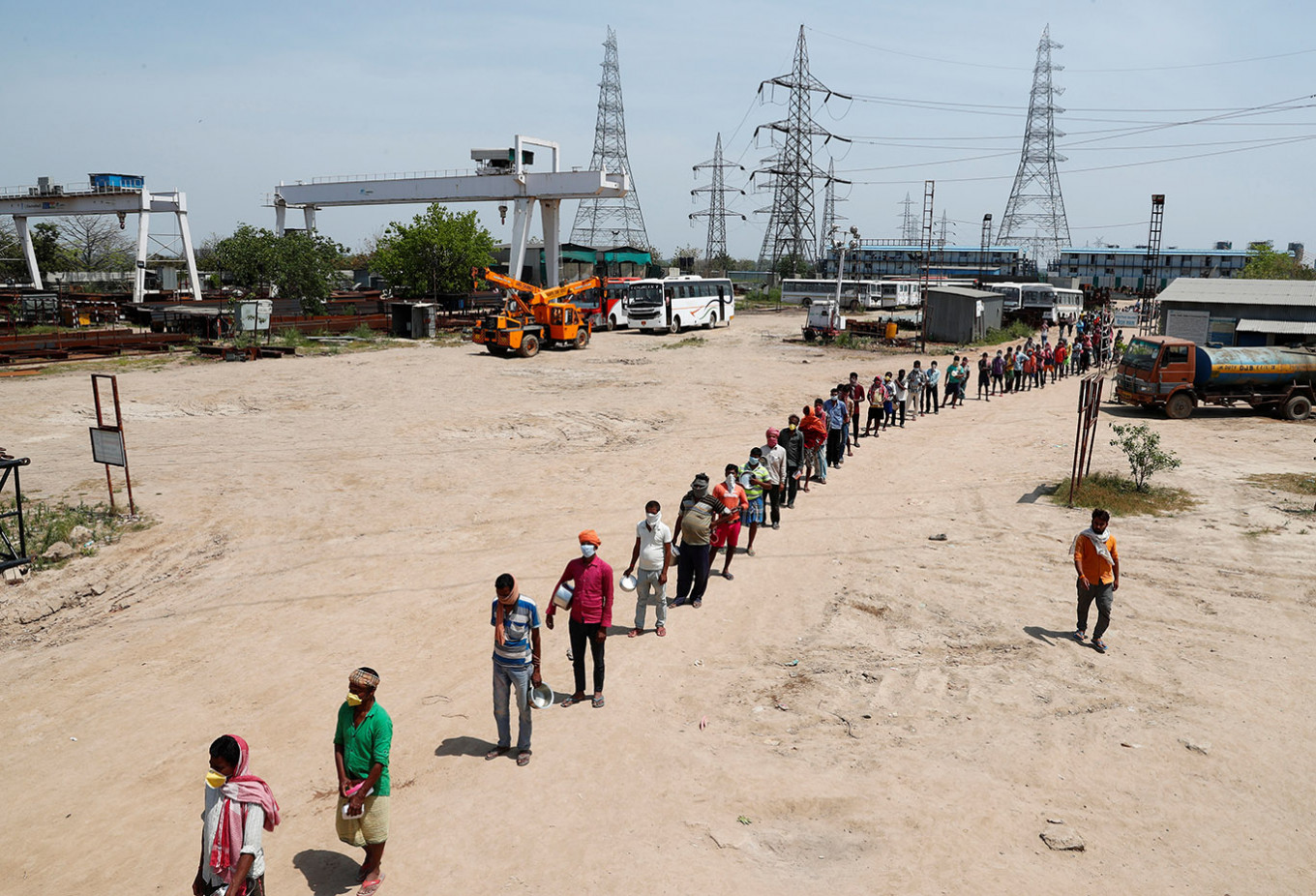Popular Reads
Top Results
Can't find what you're looking for?
View all search resultsPopular Reads
Top Results
Can't find what you're looking for?
View all search resultsInsight: Pandemic policing lessons from India
Change text size
Gift Premium Articles
to Anyone
I
ndia has been in nationwide lockdown since March 24 as a preventive measure against COVID-19. There are plenty of lessons Indonesia can draw from India, from the economics of lockdown to boosting an underwhelming healthcare system in an emergency.
But what about India’s effort to police and enforce the nationwide lockdown on a population of 1.3 billion? Prime Minister Narendra Modi only gave the country and its people a four-hour notice when he announced the lockdown. The national police force thus had little time to prepare.
Parts of the country saw a breakdown in law and order, with reports of policemen soliciting bribes and engaging in illicit actions from harassment to assault. The police seemed to resort to teargas, public beatings with batons and other forms of corporeal punishment. Thousands were disciplined, arrested and charged for minor violations.
While it is unclear whether these problems occurred nationwide, cases of violence involving migrant workers appeared to be more widespread. After all, domestic migrants are perhaps the most vulnerable group to be affected by the lockdown. For minorities, especially Indian Muslims, the police’s heavy-handed approach during the lockdown may be another extension of the ruling government’s divisiveness.
The Status of Policing in India Report 2019, an independent study produced by Common Cause and the Center for the Study of Developing Societies, has found respectively that 14 percent and 24 percent of the police force feel that Muslims and migrants are “very much naturally prone to committing crimes”.
Prior to the lockdown, analysts criticized the police for their brazen high-handedness. Earlier this year, for example, police arrested those protesting the new citizenship law on dubious charges, including students who were also assaulted on university campuses.
Since the Modi-led Bharatiya Janata Party (BJP) came into power in 2014, India has seen a rise in violence that targets minorities. According to Human Rights Watch, at least 36 Muslims have been killed in “cow-related violence” across 12 Indian states between May 2015 and December 2018.
Indian Muslims were also victims in 83 percent of 195 religious hate crimes between June 2014 and December 2018, according to a study by economist Deepankar Basu. He noted that these incidents were facilitated by weakened law enforcement at the state level due to the “criminalization of politics” and the “politicization of the police”.
In 2004, 12 percent of elected parliamentarians were linked to serious criminal cases. By 2019, figure had grown to 28 percent. Political scientist Milan Vaishnav noted that data from three consecutive general elections (in 2004, 2009 and 2014) showed that a candidate linked to a criminal case was, on average, almost three times as likely to win than one without a criminal link.
The criminalization of politics may affect policing behavior, as such politicians are less incentivized to boost police professionalism and effectiveness.
It could also exacerbate politicization of the police, which some argue is a colonial legacy. Political intelligence gathering was and remains a major focus of the national police force. The Status of Policing in India Report 2018 claimed: “Police establishments across India continue to function largely in the same casual and repressive fashion as the colonial masters had envisioned.”
Surveys suggest many Indians feel that the police are unlikely to follow up a victim’s complaint without some political influence. Police officers concur.
According to the 2019 report, 28 percent of the police force believed that pressure from politicians was the biggest hindrance in criminal investigations, while 38 percent reported political pressure in cases involving influential persons.
Finally, the police lack resources and are confronted by numerous personnel challenges as regards both the lockdown and long-term organizational challenges.
According to security expert Zoha Waseem, police officers are likely to be overstrained by stress and fear, as they are expected to work longer shifts and are in close physical contact with the public to maintain order. This combination may lead to more violent police-citizen interactions, especially if civilians are seen as “virus carriers” and are thus regarded akin to criminals.
These lockdown stressors are compounded by long-term capacity challenges. Analysts note that there are only 144 police officers for every 100,000 people in India, compared to the United Nations’ recommended ratio of 1:222.
Indian states recently spent most of their 4 percent policing budget on salaries rather than training local police. The 2019 report noted that over the last five years, only an average 6.4 percent of the police force had been provided in-service training. Policemen worked 14 hours a day on average, with about 80 percent working more than 8 hours a day.
These contexts help us understand why violence against minority and migrant groups has increased during the nationwide COVID-19 lockdown, why the police are quick to dole out corporeal punishment and why local police have arrested members of the political opposition or regime critics in recent weeks.
Regardless, it is difficult to enforce a lockdown with a politicized police force that lacks legitimacy, especially if the government itself lacks legitimacy. Deploying a heavily criticized police force could increase public resistance or even social unrest. Heavy-handed police tactics – as the Indian police employed at the beginning the lockdown – may lead to a decline in public trust. This could, in turn, hamper efforts to control the outbreak.
Relying on an underfunded, undertrained, overworked and politicized police force might thus cause lockdown enforcement to spiral out of control.











